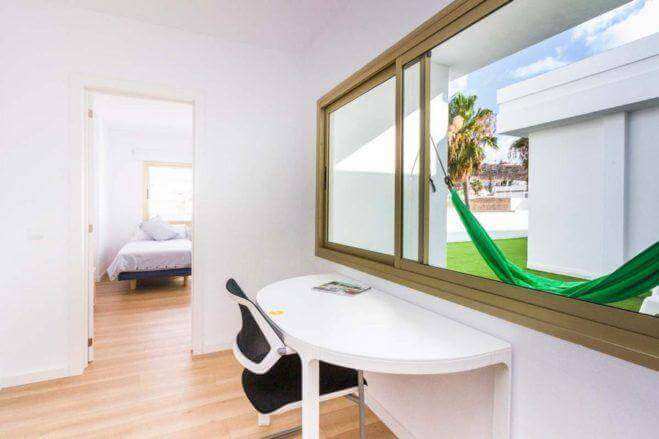
Our latest pod is a little interview with Nacho Rodriguez, resident of beautiful Las Palmas and expert on all things relating to coliving, remote work, and digital nomadism.
Where is the world of remote work going? And are we, as early digital nomads, the proverbial canary in a coal mine?
We discuss all that and more:
For a quick scan, here are the Cliff’s Notes highlights:
On the Canary Islands as a year-round destination:
The weather is always nice and mild – we don’t have very hot summers or cold winters. And that’s a big part of why we’ve become a remote work hub in Europe.
Geographically, we’re located off the west coast of Africa but belong to Spain (and have since the 15th century). Being the southernmost part of Europe has contributed to some high tourism – as a nice getaway.
On why the Canary Islands – specifically its cities Las Palmas and Tenerife – has become such a hub:
What makes Las Palmas so popular is its beautiful urban beach – one of the best in Europe. Adding to that, the weather offers a perfect combo of urban and beach lifestyles. So it gives digital nomads that ideal combo of surfing and enjoying the ocean as well as living a lively city life.
It all comes back to a high quality of life, right? And here, it’s very high – it’s also not that expensive relative to large European and Spanish cities.
And part of it is a snowball effect – digital nomads are the best communicators and the ones who’ve enjoyed the Canary Islands have paved the way for it to become more and more of a hub. Recommendations are the best kind of promotion for any city, and it’s how hubs naturally evolve.
On how Nacho got sucked into the world of digital nomadism, even while at stationed at home:
I spent a bunch of time living and traveling in the U.S. and Europe and when I got home I felt that I missed that interaction with an international community of interesting people.
So we wanted to find ways to speed up that process and build a larger community. And part of the solution was creating our coworking space and hosting events for local DN’s.
Soon after, we created a coliving spot as a solution to our coworkers’ interest in convenient, affordable accommodation. Now it’s evolved much further – we have three coliving locations for nomads and remote workers that double as off-sites for distributed companies.
Along this process, we’ve realized that digital nomadism is a smaller subsect of the flexible work movement. Which we are totally passionate about – remote work is not the future, it’s the present. And so we got inspired to speed up that movement.
As for my personal travel – it started as traveling for work and eventually became my choice. And this year, I’m even experimenting with a remote work lifestyle with my family.
On the subset of digital nomads as a movement – both in the present and future:
Again, digital nomadism is just a small part of the movement. It includes those professionals that take advantage of working from anywhere to travel the world in a more “intense” way. But from personal experience, a lot of those digital nomads slowly become just remote workers. So they start traveling a bit slower or even set up something like a home base. And I feel that that’s going to be the case for most people. Traveling intensively is great for a period of time but it’s not super ideal long-term.
But in any case, the great thing is to have the flexibility to do it whenever you want. You want that perceived freedom even if you don’t always exercise it.
Underneath it all, though, lies a shift in values. Older generations were educated to secure attachments – get a job, buy a house, buy a car, etc… But a new cultural wave is going against attachments and ownership. It’s all about experiencing things and being flexible. And I think this growing trend is ideal.
You even see it in the non-nomadic sphere: Employers and employees are valuing the concept of remote work more than ever before. For employers, it widens their potential talent pool, and for employees, it increases their range of freedom – even if for only one day a week.
On the loss of permanent conenctions – not just from the transience of locatin independence but even from the remote work’s lack of “work friends”:
The reality is: Remote work does not come without challenges. And isolation is one of the big ones.
But there are a lot of solutions – Remote teams often hold company off-sites and retreats. Particularly to ensure a bond of friendship between colleagues and eliminate some of that barrier from working remotely.
Plus, lots of remote workers don’t actually work from home – they head to a coworking space or a cafe and tap into the community there.
So there are solutions to these challenges; they just require a switch in mindsets. And even then, the positives far outweigh these fixable downsides.
On the future of coworking as a trend – is it here to stay?
The confident short answer: Yes.
There have been some speedbumps (see: this past year for WeWork), but digitalization is already permanently changing the way companies work. And coworking spaces will play a large role in that – especially as these places become more developed and widespread.
How about coliving – what exactly does it entail and how can it be advantageous for digital nomads?
Coliving also comes in many variations. It can look like a coworking space or a business center or something else altogether.
At our space, you live and work with a like-minded community. This provides a huge value: From day one, you connect with a group of interesting people.
When I talk to some of our visitors, the feedback I always get is that they feel at home. And when you’re traveling intensively, that makes a huge difference. You just don’t always get that from living in an Airbnb and attending a coworking space – at least not this quickly.
Plus, on our end, we organize weekly events and meetups to boost social and professional interactions. So underneath that social aspect, there’s always a consistent energy of productivity.
On the potential reaches of coliving:
I recently heard about a spot that does “coliving for families.” And I’ve always felt that coliving would be a huge solution for the elderly. Plus, there is an element of efficiency to coliving spaces from a real estate affordability aspect.
So there is a part of me that sees this as a way to fight the growing isolation in society.
Overall, though, as remote work among freelancers, companies, and startups keeps rising, the reach of coliving and coworking spaces will keep growing. We’re excited to see where it goes!
Do you have any experience with coworking? Any impressions or tips? Share in the comments below!



Thanks for sharing this awesome piece of information. I’m on a trip to nacho in a couple of weeks . This will help me to spend the days I’m gonna spend there wisely
Glad to hear it & enjoy your trip!
Hey, I’m looking at going to the canary’s to work and base myself there for a bit to surf more. My one issue is that I work better with a second screen connected to my laptop.
Do you know of a solution for this out in the Canary’s?
hey Sean,
i would just either get a second screen with you, or buy it there. Then you just need a coworking space that allows you a fixed workstation so you can leave the second screen there. I know someone who has been traveling with a second screen for years.